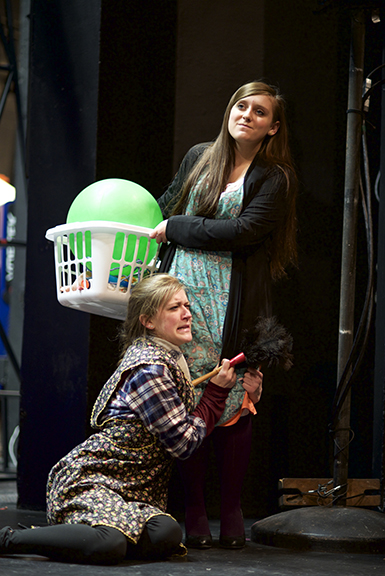
The University Theatre season continues this March with Thornton Wilder’s “The Skin of Our Teeth.”
Performances are March 5-7 and 11-14 at 7:30 p.m. and March 15 at 2 p.m. in Howell Theatre, located on the first floor of the Temple Building at 12th and R sts.
In the play, George and Maggie Antrobus; their two children, Gladys and Henry; and maid Sabina overcome ice, flood and war—by the skin of their teeth.
Director Virginia Smith noted that when the play premiered in 1942, World War II was still ongoing. The Nazis were still in Germany and had Europe under its thumb, while the Japanese controlled the Pacific arena.
“I think Thonton Wilder was looking at our past and seeing that the human race gets through by the skin of our teeth,” Smith said. “And I think we’re at a time like that, too. When you hear on the news all of the stories about climate changes and oceans rising and bird flus and other pandemics, and I know we’re in an era of fear-mongering with the 24/7 news cycle. What’s more interesting than a crisis? It’s an interesting idea to think about whether we will survive.”
Luke Glassman, a senior theatre and economics major from Ankeny, Iowa, plays George Antrobus. Smith said his character is necessary for survival because he is the inventor and seeks knowledge, including spirituality and philosophy. Emma Gruhl, a junior theatre major from Lincoln, plays his wife, Maggie Antrobus.
“Mrs. Antrobus represents the keeping of the home,” Smith said. “And she has almost magical properties for being able to keep the home together. For example, our actual set cracks open, and she’s able to close the cracks. Woman’s ability to keep the family going and to keep the children safe is the other half of the knowledge and spirituality and philosophical thought.”
Kayla Klammer, a senior theatre and dance major from Ainsworth, Nebraska, plays Sabina, the temptress.
“She is such an interesting woman. It’s really almost like playing three characters all in one show,” Klammer said. “The changes in intention and character between Act I, Act II and Act II have really been a challenge for me as a performer. You never really know what she’s going to do next.”
The name Antrobus comes from the Greek word “anthropos,” which means “human.” The play is an allegory about the life of mankind, centering on this family in the fictional town of Excelsior, New Jersey.
“’The Skin of Our Teeth’ is a story of the archetypal suburban family,” Glassman said. “It is perhaps best described as a story crafted by throwing all other stories of mankind's history into a big blender and then letting the particulates settle where they willed. It is both a celebration and a warning about the spirit of humanity. And it's pretty funny along the way.”
In Act I, the glaciers are approaching. In Act II, the characters must survive the great flood. The last act takes place after World War II. Mr. Antrobus tries to face how to make peace with the divisive force within his own home.
“The play is crazy because we’re in crazy times,” Smith said. “How do we ever have peace? How do we survive in that way without killing each other?”
For the University Theatre production, Smith has updated the play so it takes place in 2015.
“I try to be as relevant as possible to today,” she said. “It’s a comedy, but it’s also an allegory.”
The cast includes 18 undergraduates, and Glassman is excited to work with the ensemble.
“Good ensembles make good theatre,” he said. “I am incredibly excited to work with the people in this cast. We all have a lot of fun together on stage, and I am certain the audience will see that and love these people as much as I do.”
For Klammer, it’s her final show on the mainstage at UNL.
“It’s sort of bittersweet, but it’s also making me extremely excited to take what I’ve learned from my theatrical experiences at school, and put them into practice in the real world,” she said. “I couldn’t have asked for a better role or opportunity for my last hurrah.”
The crew includes set designer Michaela Stein, lighting designer Sheric Hull, sound designer Sonia Sandoval and costume designer Megan Cudd, under the technical direction of Assistant Professor of Practice Mitch Critel. Chadwick Taylor is serving as assistant director and musical director.
Smith said the production will be influenced by Bertolt Brecht, a German playwright known for departing from the conventions of theatrical illusion.
“We decided that Thornton Wilder and Brecht were working at the same time,” Smith said. “And Thornton Wilder liked showing the bones behind the theatre. He wasn’t into the illusion, and neither was Brecht. So we’re planning on having sound effects made by an actor on a microphone, the walls can be seen through, we’re not using much masking so you’re going to see the run crew and the shadows of things behind the scenes.”
Glassman said audiences should expect a fun show with fascinating characters.
“The staging of the show is unlike anything we've done before,” he said. “We want to leave an impact, and I think this show will do it. It'll stay with you.”
Klammer said audiences should expect both everything and nothing.
“I would like to invite the audience to come play with us, to keep an open mind, to listen and to learn,” she said. “And most importantly have fun.”
Tickets are $16 for adults, $14 for faculty/staff/senior citizens and $10 for students with ID. Advanced tickets are available through the Lied Center Box Office at (402) 472-4747 or (800) 432-3231 or online at http://unltheatretickets.universitytickets.com/. Tickets are also available one hour before each performance in the Temple Theatres Lobby.
“The greatest joy in our lives is standing on that stage, performing for an audience,” Glassman said. “So we are eternally grateful to everyone who comes to see us.”